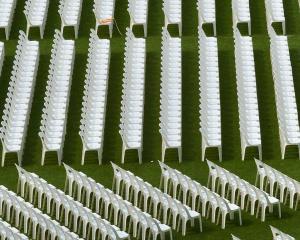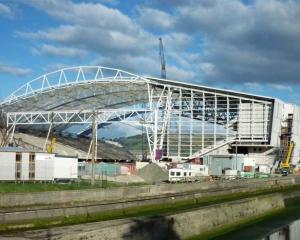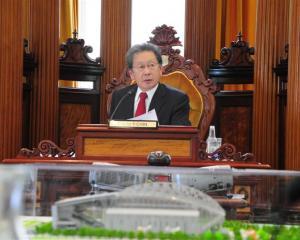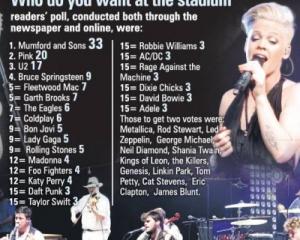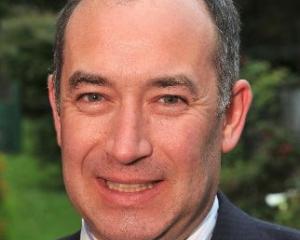Stop the stadium, or wait for the possibility of a Government bail-out: those are two options councillors will sit to consider when they make a supposedly final decision on the project on Monday.
A report to the meeting from Dunedin City Council chief executive Jim Harland, released yesterday, said funding shortfalls for the project could be as high as $35 million, including an as-yet unsuccessful attempt by the council to find a $20 million reduction in the rates impost from the stadium.
The project was already over budget by $7.7 million because of additional land costs, Mr Harland said.
Carisbrook Stadium Trust chief executive Malcolm Farry yesterday said he was surprised by the two options, but he had not read the report, and could make little further comment.
He did say the trust was responsible for $15 million of the $35 million shortfall.
A condition set by the council had been that the trust raise 60%, or $27.3 million, of $45.5 million of private-sector funding needed for the project.
Mr Farry said the trust's efforts had netted $21.5 million, with $5.8 million "pending", making a total of $27.3 million.
The money pending was from "genuine confirmations" to buy seating packages.
The trust does appear to have made significant headway in ticking off the conditions set by the council in March, but some are yet to be concluded.
Those include a settlement agreement between the city and regional councils and the University of Otago, an agreement for the sale and purchase of Carisbrook, and an agreement between the trust and the Otago Rugby Football Union, but those were expected to be achieved by the end of February.
Mr Harland suggested two options for the council.
The first was to "stop the project now".
Expenses to the end of last year were $13.8 million, excluding the $33 million cost of land at Awatea St, and could be paid off over five years.
The second option was to delay a final decision until the issue of possible Government funding was resolved.
Mr Harland yesterday said the shortfall included the council's $20 million, as, although many avenues had been explored, a way had not been found to raise the money.
The other $15 million was money the trust was seeking as a grant or suspensory loan from the Government.
Money from a grant or loan would be used to pay builders and suppliers before seating funding came through, but may not be needed depending on seating sales.
The report said the final estimate for land procurement had increased by $8.6 million because $5 million had not been received from the sale of Carisbrook, and because of some additional relocation costs.
Mr Harland said the sale of Carisbrook had been removed from the equation, because any money made would be used to pay debt accrued on the ground.
In his report, Mr Harland said "uncertainties in the development are high", though many of the high-risk uncertainties had been removed.
In a table outlining risks, the council's attempt to raise $20 million for the stadium is in the high-risk column, as are operational costs and the sale of corporate suites.
The operational cost risk related to the proportion of corporate-box and other seating-package holders who chose not to renew contracts after five years.
Last year, the trust cut the length of the contract period to attract more sales.
But the guaranteed maximum price is a condition that has been met: Hawkins Construction has tabled a figure of $129.7 million, an offer open for 60 days, on the basis of demolition work beginning on May 1 this year and construction starting in mid-June.
That leaves $2.2 million unallocated, which could be used as a contingency fund.
A Horwath HTL report noted the economic climate created a risk the trust could not raise sufficient funds, and the stadium would have a negative operational cash flow after 10 years if lounge-membership sales fell to 1250.
But the report said the new stadium would be "significantly superior" to Carisbrook, would probably attract more tests, and had greater potential for other events.
A net cash flow of just $282,000 was predicted in years one to 10 - 25% less than projected in 2007 - and $2.8 million in years 11 to 20.
Stop the Stadium president Bev Butler said it was obvious if councillors had integrity they would vote against the project, as the conditions had not been met.
Conditions
1.Project cost not to exceed $188 million. Result: Cost $195 million.
2.Guaranteed maximum price to be put in place. Result: Achieved.
3.Settlement agreement between city, regional councils and university. Result: Expected end of February.
4.Plan change. Result: Approved, subject to appeal.
5.Service level agreement complete. Result: Achieved.
6.ORC contribution of $37.4 million. Result: Decision on Wednesday.
7.Sale and purchase of Carisbrook. Result: Expected by end of February.
8.Agreement between trust and ORFU. Result: Expected shortly.
9.Sixty percent of $45.5 million private-sector funding raised. Result: $21.5 million contracted, $5.8 million pending.
10.Council to find $20 million to offset rates. Result: Needs Government support.
11.Community Trust of Otago funding of $10 million. Result: $7 million granted.
City council meeting to make decision: Monday, 10.30am.
Regional council meeting to make decision: Wednesday, 10.30am.

